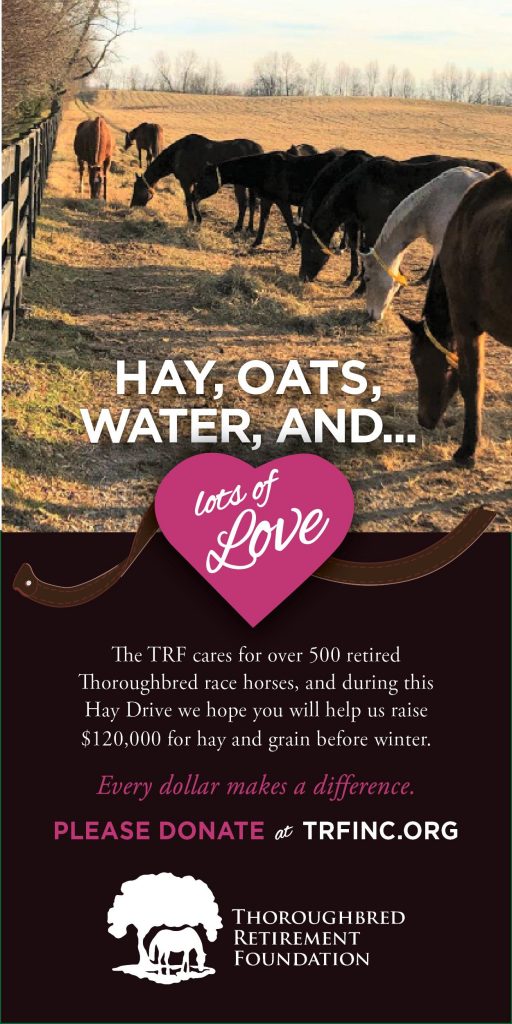
SARATOGA SPRINGS, N.Y.— There’s a special charge that Steve Houghton in his position as program advisor for the Saratoga WarHorse Foundation experiences most every time he meets a fellow veteran enrolled in the organization’s intensive three-day connection process.
It’s not when Houghton goes to the airport to picks up the veteran or service member, many of whom are living with Post-Traumatic Stress Disorder (PTSD) and struggling to transition back to civilian life. Nor it is in the midst of the sessions in which veterans work with off-track thoroughbreds (OTTBs).
What resonates with Houghton is when he delivers the veteran back to the airport for their flight home and he can sense what he calls the beginning of their “transformation.” That’s when he can see the veterans starting to reestablish the trust that comes from working with horses – the kind this innovative rehabilitation organization has pioneered to help vets reclaim their lives.
One reason that Houghton can see the progress is because he’s a Saratoga WarHorse graduate himself. The retired U.S. Army Sergeant First Class served 20 years, 11 of which he was stationed in Kosovo, Iraq, Afghanistan and Kuwait. Surviving nine attacks and losing an eye from explosive devices during his military service, he returned to civilian life and just wanted to withdraw.
Houghton said his lingering physical and psychological wounds at times, “seemed insurmountable.” For a time, he was homeless, living out of his truck in Georgia. And though he attended treatment and support groups, nothing seemed to work. Finally, a military buddy who Houghton met in group therapy suggested that he attend the Saratoga WarHorse program.
So in March 2017, he did. Entering the round pen with the retired racehorse Party Favor was, “my miracle,” Houghton said. “I felt totally relieved right away. I literally felt I didn’t have anything to worry about. It was so powerful. I overcame my PTSD and was able to pull myself out of homelessness.”
Houghton is hardly alone. Since 2013, Saratoga WarHorse has worked with nearly 1,500 veterans who suffer from nightmares, depression, anger, withdrawal and other issues caused by trauma. Saratoga WarHorse operates at a Saratoga-area farm; and at satellite locations in Aiken, South Carolina and Baltimore County Maryland.
The Saratoga WarHorse program evolves over three days with an average of five participants. The program is available to veterans and service members from all branches of the military, regardless of when or for how long they served. There is no cost for veterans to participate; travel, lodging, meals and expenses are covered.
Saratoga WarHorse isn’t traditional therapy. It’s a therapeutic experience designed to help participants get past the physiological symptoms of Post-Traumatic Stress. It begins with classroom instruction, followed by the veteran entering a pen to meet the OTTB. The goal is to connect, to touch and make contact. By utilizing the silent language of the horse, a mutual trust and profound bond is established that goes beyond verbal communication.
Allison Cherkosly, executive director and CEO of Saratoga WarHorse, who also served in Afghanistan, said that process, which can take between five and 45 minutes, creates a profound personal connection between the veteran and horse, “unlocking” a part of the veteran that has been closed off for years. Though the duration of the connection process varies, it is for the most part, predictable, sequential and repeatable, she added.
“When I first started with Saratoga WarHorse, I almost couldn’t believe it,” Cherkosly said. “But the process triggers a relaxation response that happens when the horse is willing to connect with the veteran.”
Cherkosly stressed that the experience can be beneficial as well for the horses, all of whom are OTTBs. “Like the veterans we serve, these retired racehorses are going through a transition period,” she said, “and the Saratoga WarHorse program helps them successfully adjust to life off the track and find purpose in their new lives.”
“It’s an authentic process,” Cherkosly said. “When they go in the round pen, the veteran is giving off nervous energy. The horses, prey animals, are intuitive and can smell the adrenaline rush. They’ll stay as far away as they can. The veterans have to work their way through the reaction.”
That’s what happened to Saratoga WarHorse graduate John. “I had never handled a horse before,” he said. “It was a challenge that I was excited to take on. I wanted to prove to myself that I was capable of trust and worth being trusted. My horse companion for the day, Done Done Done, was an athlete in his racing days. He and I were able to find common ground and mutual understanding. We both agreed that what we each needed during our time in the ring was each other.”
For Houghton, the benefits continue. After going through the Saratoga WarHorse program, he joined the organization to help other vets and continue to heal himself. Today, he and his girlfriend Abby, also a “WarHorse” graduate, live on a farm in Wagener, South Carolina with five OTTBs and a donkey. Houghton is also pursuing a bachelor’s degree.
“Saratoga WarHorse is something that is so therapeutic,” Houghton said. “I want every veteran to experience it. It works.”
NYRA Press Office


